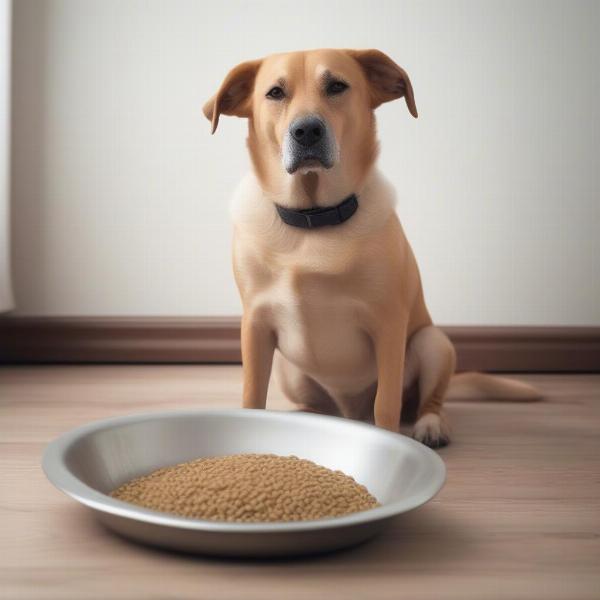Rachael Ray Nutrish dog food has been a popular choice for pet owners, but recent recalls have raised concerns. This article delves into the Rachael Ray dog food recalls, examining the reasons behind them, the specific products affected, and what you should do if you have recalled food at home. We’ll also discuss alternatives to Rachael Ray and offer tips for choosing safe and healthy dog food.
Understanding the Rachael Ray Dog Food Recalls
Several recalls have been issued for Rachael Ray Nutrish dog food over the years, primarily due to potential contamination. Some recalls involved elevated levels of vitamin D, which can be harmful to dogs in large quantities, causing symptoms like vomiting, loss of appetite, and increased thirst. Other recalls were issued due to the potential presence of Salmonella. These recalls highlight the importance of staying informed about pet food safety and checking for updates from manufacturers and regulatory bodies like the FDA.
What to Do if You Have Recalled Rachael Ray Dog Food
If you have any recalled Rachael Ray Nutrish dog food, stop feeding it to your dog immediately. Check the product code and manufacturing date against the information provided in the recall notice. Contact the manufacturer for further instructions, which usually involve returning the product for a refund or replacement. If your dog shows any signs of illness after consuming the recalled food, consult your veterinarian.
Rachael Ray Nutrish Dog Food Complaints: Beyond Recalls
Apart from the recalls, some pet owners have reported other issues with Rachael Ray Nutrish dog food, including digestive problems and allergic reactions in their dogs. While these complaints haven’t led to official recalls, they underscore the importance of monitoring your dog’s health closely after introducing any new food. rachael-ray-nutrish-dog-food-complaints provides more information on these concerns.
 Dog with Digestive Issues
Dog with Digestive Issues
Choosing Safe and Healthy Dog Food Alternatives
Choosing the right dog food can be daunting, especially after a recall. Look for brands that prioritize high-quality ingredients, avoid artificial colors, flavors, and preservatives, and conduct regular quality control testing. Consult your veterinarian for recommendations tailored to your dog’s specific needs and breed.
Key Considerations When Selecting Dog Food
Several factors contribute to a dog food’s safety and nutritional value:
- Ingredients: Opt for whole meat sources as the primary ingredient and avoid fillers like corn, wheat, and soy.
- Nutritional Balance: Ensure the food meets AAFCO (Association of American Feed Control Officials) standards for complete and balanced nutrition.
- Life Stage: Choose a formula appropriate for your dog’s age, breed size, and activity level.
- Manufacturing Practices: Look for brands with transparent sourcing and rigorous quality control measures.
Is Rachael Ray Dog Food Safe Now?
While Rachael Ray Nutrish remains a popular brand, the recalls have understandably shaken consumer confidence. Staying informed about current recalls and choosing dog food based on thorough research and your veterinarian’s recommendations are crucial for ensuring your dog’s safety and well-being.
Conclusion
The Rachael Ray dog food recalls serve as a reminder of the importance of vigilance in pet food choices. By understanding the reasons behind the recalls, knowing what to do if you possess recalled products, and focusing on selecting safe and healthy alternatives, you can ensure your canine companion receives the best possible nutrition.
FAQ
- What should I do if my dog ate recalled Rachael Ray dog food? Contact your veterinarian immediately, especially if your dog exhibits any symptoms like vomiting, diarrhea, or loss of appetite.
- Where can I find the latest information on Rachael Ray dog food recalls? Check the FDA website and the Rachael Ray Nutrish website for the most up-to-date recall information.
- Are there other dog food brands similar to Rachael Ray Nutrish? Yes, there are many brands offering similar formulations and price points. Consult your veterinarian for recommendations tailored to your dog’s specific needs.
- What are the signs of vitamin D toxicity in dogs? Symptoms of vitamin D toxicity include vomiting, increased thirst and urination, loss of appetite, and weight loss.
- How can I report a problem with my dog’s food? Contact the manufacturer directly and also report the issue to the FDA.
Related Articles
About ILM Dog
ILM Dog is your trusted global resource for expert dog care and nutrition advice. We offer practical guidance on everything from breed selection and puppy care to senior dog health and behavior training. Our mission is to empower dog owners worldwide with the knowledge and resources they need to provide the best possible care for their beloved companions. For personalized advice on dog nutrition and health, contact us at [email protected] or call us at +44 20-3965-8624.